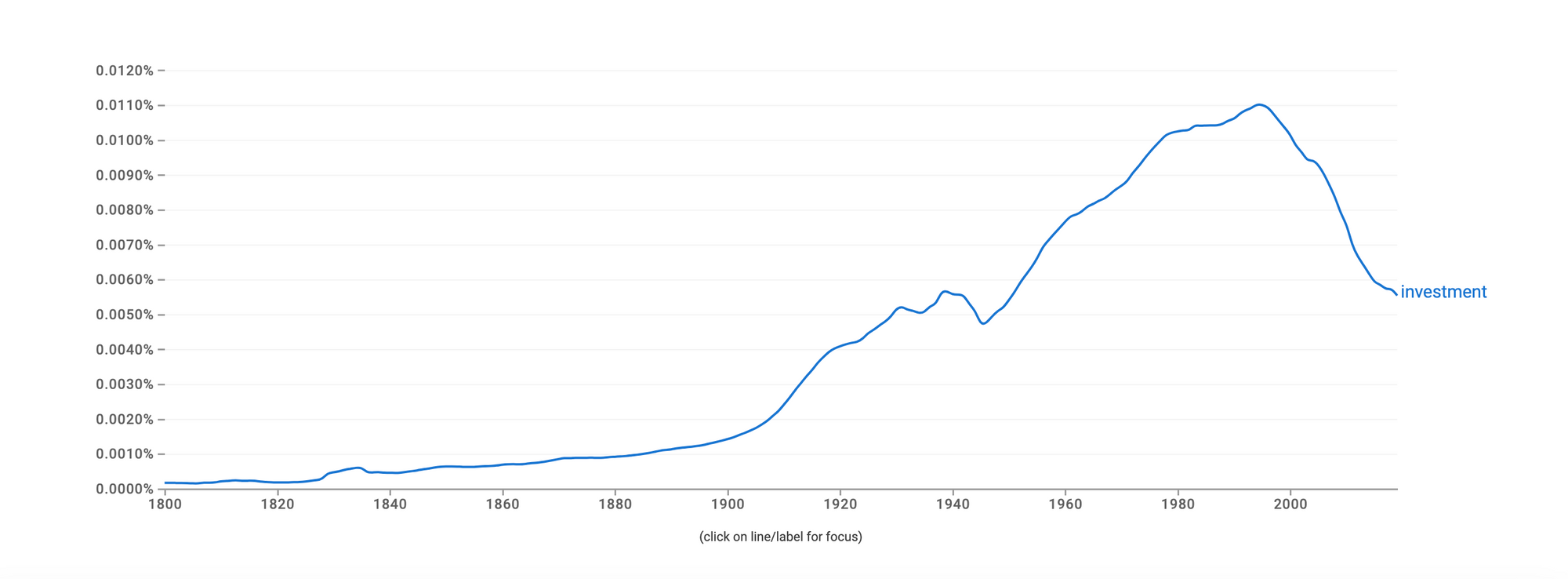- The most common abbreviation for "investment" is "inv."
In this sentence, "inv." is an abbreviation for "investment." The company attributes the significant increase in profits to their strategic investment in innovative technologies during the last fiscal year.
Investment
Parts of Speech: Noun
The act of laying out money or capital to acquire or improve an asset for the purpose of generating income or profit.
- Financial assets: Buying stocks, bonds, mutual funds, ETFs, etc., with the expectation of earning returns through dividends, interest, or capital appreciation.
- Real estate: Purchasing property with the intention of generating rental income, experiencing value appreciation, or both.
- Businesses: Putting money into a company to become an owner and share in its profits.
- Intangible assets: Investing in education, training, or skills development to enhance future earning potential.
The asset itself that has been acquired or improved.
- Securities: Shares of stock, bonds, or other financial instruments held in an investment portfolio.
- Physical property: Land, buildings, or other tangible assets purchased for investment purposes.
- Business ownership: A stake in a company acquired through investment.
The act of devoting time, effort, or other resources to something with the expectation of future benefits.
- Relationships: Investing time and emotional energy into building strong personal connections.
- Health: Investing in healthy habits, exercise, and nutrition for long-term well-being.
- Personal growth: Investing in learning, self-improvement, and skill development.
Usage of investment
The use of the word "investment" peaked in the 2000s. Since then, its use has decreased steeply.

Abbreviation of investment
The abbreviation for "investment" is commonly represented as "inv." This concise form is widely used in financial reports, correspondence, and official documents, providing an efficient way to refer to various investments made by individuals or companies in diverse financial instruments.

When to use inv.
The abbreviation "inv." is commonly used in written and formal contexts to represent the word "investment."
- Financial Reports: In financial reports, statements, or summaries, "inv." can be employed to concisely refer to various investments made by a company or individual.
Example: The balance sheet highlights the company's diverse inv. portfolio, including stocks, bonds, and real estate.
- Business Correspondence: In professional communication, especially in written documents, letters, or emails related to finance or investments, you may use "inv." for brevity.
Example: We appreciate your interest in our inv. opportunities and would be happy to provide further details upon request.
- Research Papers or Articles: When discussing investment strategies, trends, or analyses in research papers or articles, using "inv." can streamline the text.
Example: The study explores the correlation between sustainable practices and inv. performance in the current market.
- Financial Presentations: In presentations or slideshows related to finance or investment topics, abbreviating "investment" as "inv." can help maintain clarity and save space.
Example: Slide 10: Overview of our inv. strategy for the upcoming fiscal year.
- Official Documents: In legal or formal documents, "inv." may be used to represent investments within contracts, agreements, or other written materials.
Example: The contract outlines the terms and conditions regarding the inv. of funds into the joint venture.
Summary
Understanding and using abbreviations for "investment" not only saves time but also enhances communication in the fast-paced world of finance. Whether you're deciphering financial reports, engaging in market discussions, or exploring new investment opportunities, a grasp of these abbreviations will empower you to navigate the language of investments with confidence.

Want to sound like a native speaker?
Engram’s AI-powered grammar checker makes your English sound like a native speaker’s, suggesting natural English expressions on top of fixing grammar, spelling, punctuation, word order, and vocabulary.

References:














